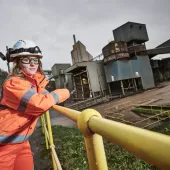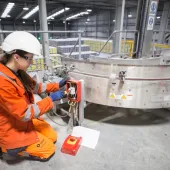Strength in Recognizing Your Weaknesses

First published in the November 2017 issue of Quarry Management
Fourth in a series of quarterly round-ups of industry activity relating to the Institute of Quarrying's four Skills Wheel themes
Like any industry, successful professionals within the quarrying and mineral extractives sector are acutely aware of their own personal attributes and how to develop their skills in different areas to keep their career moving forward.
The Institute of Quarrying’s Skills Wheel’s Personal Effectiveness segment focuses on raising awareness of personal attributes for quarrying and mineral extractives professionals, identifying how to evaluate personal strengths and weaknesses in order to grow personally and professionally.
James Thorne, chief executive of the Institute of Quarrying (IQ), said: ‘We recognize that people working in today’s modern site operations need a range of expertise in order to be effective beyond the basics of the job itself. We also know that those businesses which continually develop their staff have a more motivated and valued workforce that will deliver better operational performance.
‘As the international professional body for quarrying, construction and related extractive and processing industries, we want to make identifying opportunities for potential skills and professional development as straightforward as possible. Our Personal Effectiveness segment provides a great starting point that is designed to help individuals recognize strengths and weaknesses, both personally and professionally, in the context of their working role.
‘The IQ Skills Wheel reflects the core skills and areas of knowledge that all members of IQ should aim to develop as part of their commitment to lifelong learning. But it’s not just our members who should invest in CPD – businesses and individuals working in this sector should see continuous professional development not as a ‘nice to have’ but as an essential investment for future success.’
The Personal Effectiveness segment covers a number of important components for career success. Some are more tangible, such as preparing a CV and tailoring it to specific roles, whilst others focus on aspirations such as working abroad. All are designed to equip individuals with the skills and knowledge to do their job.
Julian Smallshaw is head of educational development at IQ. He has been involved with the quarrying industry all his working life. Starting out as a management trainee at 17 years old, he made a point of gaining experience in as many operational environments as possible. This culminated in running multi-million tonnes per year operations in the Middle East.
‘Understanding personal qualities is key to progression; they are, after all, what make you who you are. As well as the knowledge and skills that you are able to bring to your work, your personal qualities define how you will go about applying yourself to a role or task. Learning how to identify and make best use of your personal qualities is an important part of being able to develop both personally and professionally,’ said Mr Smallshaw.
‘As a professional in the quarrying industry, it is important that you understand your own attributes and how they impact on you doing your job. Having an insight into the attitudes, behaviours and preferences of others helps to build teams and leads others towards successful performances. Understanding your own and others’ personality traits can help with problem solving, particularly where the problem is rooted in behaviours.’
Crossing continents
Twenty-six-year-old Teresa Pérez Rodríguez is from the Asturias region in the north of Spain. She is a graduate management trainee at Aggregate Industries currently working in the Lytag lightweight aggregate business in Yorkshire.
‘I’m always looking to develop my personal effectiveness, so continuous professional development is very important to me. I’ve already completed the Diploma in Mineral Extractive Studies at the University of Derby and, of course, as a graduate management trainee every day is about learning new skills,’ she said.
‘When I complete my graduate scheme I’d like to do the Management Development Programme course to acquire the skills to become a good manager and to develop myself in this challenging industry.
Teresa spent her first six-month placement working at Aggregate Industries’ Bardon Hill Quarry, in Leicestershire. It was here that she was introduced to the Institute of Quarrying.
‘Shortly after joining I was told about the Institute and its importance for those working in the quarrying industry. I’ve found that it’s a fantastic way to engage with other people who work in the sector. It has also been really helpful because IQ offers a variety of learning resources and training courses on important aspects of our industry.’
Understanding personal effectiveness is also about understanding and recognizing common workplace issues, such as dealing with stress and achieving a positive work–life balance. Each is important in terms of the impact it can have on individuals and their ability to do the job.
The UK loses 10.4 million working days per year as a result of work-related stress, according to the Mental Health Foundation. Beyond the impact on the economy, the cumulative effect that a poor work–life balance has on the individuals affected is impossible to measure. Those with an unhealthy balance may struggle to develop and progress in a positive way that brings satisfaction and happiness in both their personal and/or professional lives.
Managing stress effectively is key to maintaining your overall health. Healthy, happy employees are more productive, which helps to create a positive and highly effective workplace. It is important to be able to recognize the signs of stress both in yourself and in others in the team to be able to develop solutions to help manage the situation.
IQ chief executive James Thorne concluded: ‘No one models fits all when it comes to personal effectiveness, which is why understanding our individual strengths and weaknesses plays such a pivotal part in our own career progression. It’s also one constituent part of a much bigger personal and professional development picture, but one that is key to unlocking personal and business potential.’
For more information about the IQ Skills Wheel’s Personal Effectiveness segment, visit: www.quarrying.org
- Subscribe to Quarry Management, the monthly journal for the mineral products industry, to read articles before they appear on Agg-Net.com








